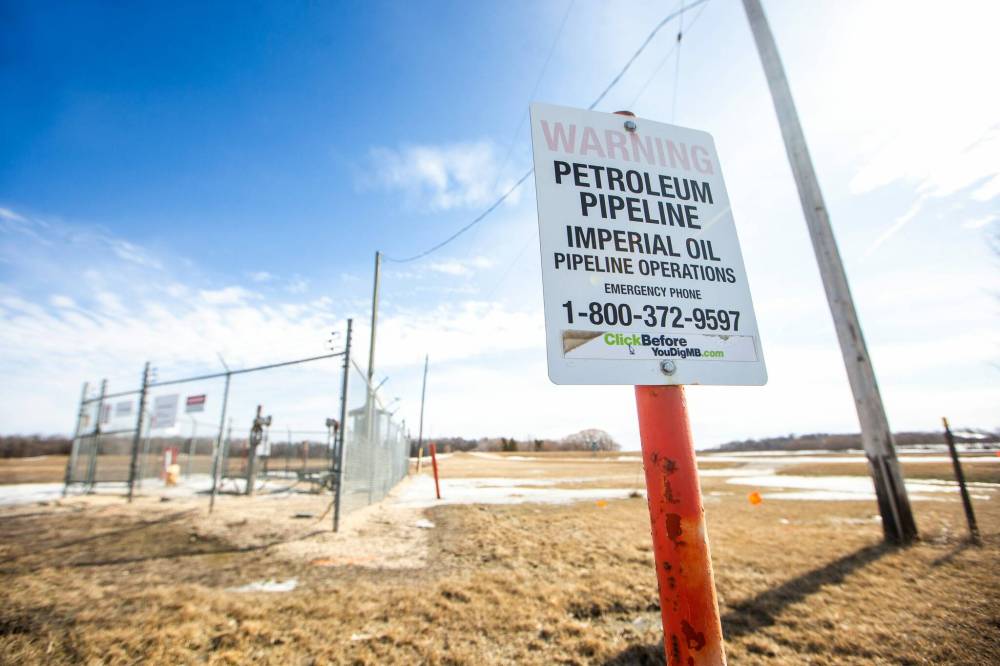Pipeline situation not quite a crisis
Advertisement
Read this article for free:
or
Already have an account? Log in here »
To continue reading, please subscribe:
Monthly Digital Subscription
$0 for the first 4 weeks*
- Enjoy unlimited reading on winnipegfreepress.com
- Read the E-Edition, our digital replica newspaper
- Access News Break, our award-winning app
- Play interactive puzzles
*No charge for 4 weeks then price increases to the regular rate of $19.00 plus GST every four weeks. Offer available to new and qualified returning subscribers only. Cancel any time.
Monthly Digital Subscription
$4.75/week*
- Enjoy unlimited reading on winnipegfreepress.com
- Read the E-Edition, our digital replica newspaper
- Access News Break, our award-winning app
- Play interactive puzzles
*Billed as $19 plus GST every four weeks. Cancel any time.
To continue reading, please subscribe:
Add Free Press access to your Brandon Sun subscription for only an additional
$1 for the first 4 weeks*
*Your next subscription payment will increase by $1.00 and you will be charged $16.99 plus GST for four weeks. After four weeks, your payment will increase to $23.99 plus GST every four weeks.
Read unlimited articles for free today:
or
Already have an account? Log in here »
Hey there, time traveller!
This article was published 21/03/2024 (637 days ago), so information in it may no longer be current.
An inconvenience, not a crisis.
That’s how government officials and a variety of informed observers are describing the abrupt shutdown of an Imperial Oil pipeline that carries Winnipeg’s main supply of gasoline, diesel and jet fuel.
And they hope the public reacts accordingly.

MIKAELA MACKENZIE / FREE PRESs fileS
The surface transport of fuel will no doubt revive the debate about how fuel is moved through the province.
Imperial Oil announced Sunday it has temporarily ceased movement of fuel through the pipeline that runs between Gretna and Winnipeg, owing to necessary repairs that must be administered to a section that runs beneath the Red River about 30 kilometres south of the city.
Repair work is expected to take about three months to complete.
During that time, fuel that would normally move through the pipeline will be shipped to Winnipeg by rail and truck. Exactly how much fuel will be moved via alternate modes has not been disclosed; Imperial Oil considers the volume of fuel moved through the pipeline, and the amount of fuel it supplies to Manitoba, to be proprietary information.
What is known is that Imperial’s terminal supplies roughly 12,000 barrels of gasoline to Winnipeg and surrounding areas daily, and that at the time of the shutdown, there was about a week’s worth of fuel in the city. In response to the shutdown, rail cars have been dispatched to Winnipeg to assist with fuel delivery.
After being briefed by Imperial representatives, government officials have been measured in their comments regarding the fuel-supply disruption. Both the province and the city have activated their emergency operations protocols to monitor the situation. City of Winnipeg chief administrative officer Michael Jack said a meeting with Imperial representatives left him “feeling good and confident about where we’re going.”
Imperial still has access to its supply, and there are other pipelines and a Shell Oil terminal in the area.
All of which is to say there is no need to overreact. Manitobans are not currently being asked to alter their fuel usage; while that advice indicates no urgent need to reduce consumption, it also carries the added message that it’s both unnecessary and unwise to engage in fuel hoarding.
That seems like a common-sense approach, but it doesn’t take much memory-jogging to conjure up images of stripped-bare toilet-paper shelves during the early months of the pandemic. Motivated self-interest, even when it’s decidedly misinformed, can make otherwise-rational people do highly irrational things.
The hoarding of fuel is unwarranted. And it’s worth considering that while those pandemic-prompted stockpiles of toilet paper were unnecessary and rather silly, they created no peril. Not so for gasoline. Storing large volumes of fuel in jerrycans or other small-volume vessels is both foolish and dangerous.
Don’t do it.
If there’s good news to be gleaned from this unfortunate turn of events, it’s that Imperial’s shutdown is a pre-emptive measure, taken in response to an inspection earlier this year that “identified integrity concerns” in a section of pipeline south of St. Adolphe. That’s much better than a shutdown necessitated by a breach that resulted in a leak or spill that caused environmental damage.
What’s sure to ensue in the coming months, as those rail cars and an untold number of trucks wend their way to Winnipeg filled with fuel, is an intensified discussion of how things are transported in this province. The added structural toll on Highway 75 — perennially criticized for its perilous disrepair — will need to be considered, and the recently reheated conversation about relocating Winnipeg’s railyards will no doubt continue.
It won’t be business as usual; there’s a chance your local service station could temporarily run short of gas as it awaits a rotating-basis fuel delivery.
But remember: inconvenience is not a crisis.
History
Updated on Thursday, March 21, 2024 9:06 AM CDT: Removes reference to number of rail cars









